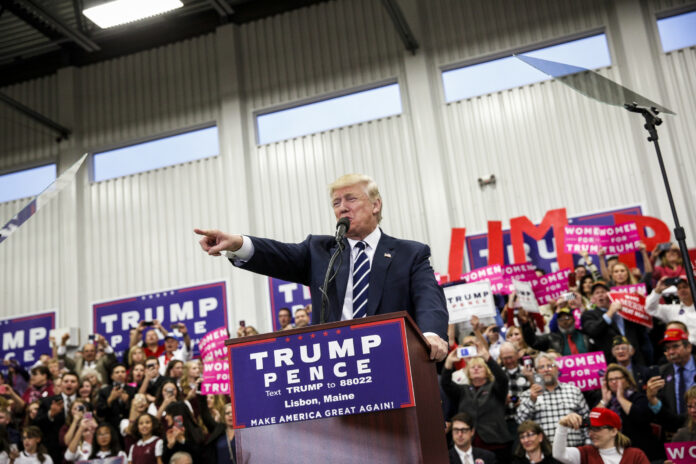Maine’s secretary of state sharply criticized Donald Trump’s quality of evidence before she removed him from the state’s ballot.
In her written ruling on December 28, Shenna Bellows said Trump’s lack of involvement was in “stark contrast” with the Maine voters who were fighting to have him removed from the ballot. She said Trump had presented evidence in footnotes when he should have presented it as exhibits in the case.
Bellows’ ruling was based on Section 3 of the 14th Amendment of the U.S. Constitution, which prohibits people from holding office if they “have engaged in insurrection or rebellion against the [Constitution], or given aid or comfort to the enemies thereof.”
Trump’s opponents argue that he encouraged the riot at the U.S. Capitol on January 6, 2021, to stop Congress from confirming Joe Biden as president.
The Colorado Supreme Court ruled on December 19 that the former president, who is the frontrunner for the 2024 Republican nomination, should be barred from the state’s ballots. Lawsuits seeking to remove Trump from the ballot citing the 14th Amendment have also been filed in 14 other states.
Bellows said the plaintiffs’ notice of what evidence they would present “stands in stark contrast to how Mr. Trump has handled exhibits never before referenced in this proceeding, that he cites in footnotes to his evidentiary objections brief.”
She said Trump has not requested that Bellows enter these exhibits into evidence and said it would not be fair to do so after her December 15 hearing on the case.
“Mr. Trump submitted an exhibit list prior to the hearing containing only one exhibit, and he could have supplemented the record with additional exhibits at the hearing. He chose not to do so, and I accordingly sustain the objection of the Rosen Challengers, as articulated in their response brief, to those exhibits,” Bellows wrote.
She repeatedly refers to the anti-Trump plaintiffs as “the Rosen Challengers” because the first named plaintiff is Kimberley Rosen, a former Republican state senator in the Maine legislature.
Bellows said that Trump had “ample notice” of the December 15 hearing but still failed to present significant evidence in the case.
She noted that the majority of the evidence that the Rosen Challengers offered at the hearing had already been presented and litigated in Anderson v. Griswold, in which the Colorado Supreme Court upheld a lower court’s decision to remove Trump from the ballot.
Sarah Rice/Getty Images
“Scott Gessler, Mr. Trump’s lead counsel here, is lead counsel for Mr. Trump in that case, too,” she noted, adding that she “afforded all parties three additional days after the hearing to organize and file their objections to any exhibits, minimizing any disadvantage that may have resulted from the delay in the exhibits being shared.”
Bellows, a Democrat, wrote that her decision to remove Trump from the ballot “is based exclusively on the record before me, and it has in no way been influenced by my political affiliation or personal views about the events of January 6, 2021.”
Stephen Gillers, a New York University law professor, told Newsweek that a Supreme Court decision will be the only way to decide if Trump should remain on ballots across the U.S.
“Once Colorado decided that Trump could not appear on the primary ballot, U.S. Supreme Court review became inevitable. Other states, most recently Michigan, have disagreed with Colorado. A Supreme Court review is the only way to get a definitive ruling and national uniformity on the question,” he said.
Uncommon Knowledge
Newsweek is committed to challenging conventional wisdom and finding connections in the search for common ground.
Newsweek is committed to challenging conventional wisdom and finding connections in the search for common ground.


